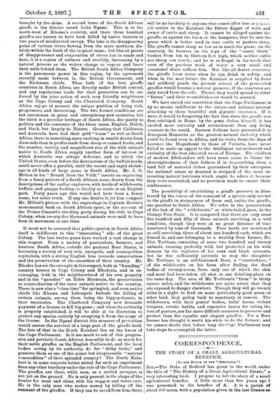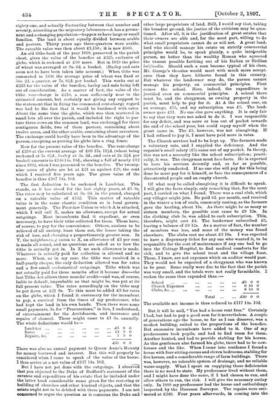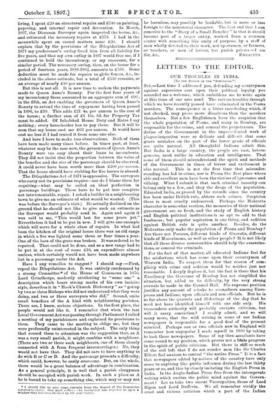CORRESPONDENCE.
THE STORY OF A SMALL AGRICULTURAL BENEFICE.
[To VIZ EDITOR OP TRZ " EPICTRTOR.") Srn,—The Duke of Bedford has given to the world, under the title of " The History of a Great Agricultural Estate," a very interesting book. I propose to tell the story of a small agricultural benefice. A little more than five years ago I was presented to the benefice of A. A is a pariah of about 950 acres, with a population given in the last Census as ,
eighty-one, and actually fluctuating between that number and seventy, according as the migratory labourers-A has a perma- nent and a changing population-happen to have large or small families. The land is about equally divided between arable and pasture. Thirty years ago three-quarters were arable. The rateable value was then about £1,150; it is now £660.
An old tithe-book of the year 1819, preserved in the parish chest, gives the value of the benefice at £325, exclusive of glebe, which is reckoned at £50 more. But in 1819 the price of wheat was averaged at 9s. 6d. a bushel (Barley and oats seem not to have been taken into account.) When tithe was commuted in 1836 the average price of wheat was fixed at 56s. 2d. a quarter, or 7s. Old. per bushel. This works out at £233 for the value of the benefice, barley and oats being left out of consideration. As a matter of fact, the value of the tithe rent-charge is £210, a sum sufficiently near to the estimated amount, but certainly not giving any support to the statement that in fixing the commuted rent-charge regard was had to the fact that it would be burdened with rates. About the same time the glebe, which was then scattered in small lots all over the parish, and included the right to pas- ture three cows on the common land, was exchanged for three contiguous fields, two of them pasture, containing about twelve acres, and the other arable, containing about seventeen. The exchange could hardly have been to the advantage of the parson, excepting as putting his glebe into a ring fence.
Now for the present value of the benefice. The rent-charge of £210 at the current average of £69 17s. 11d. (wheat being reckoned at 3s. 60., barley at 3s. 2d., and oats at 2s. 2fd. per bushel) amounts to 214614s. 10d., showing a fall of nearly £12 since 1892, when I was presented to the benefice. The twenty- nine acres of glebe are let at £21 as against £28, the rent which I received five years ago. The gross value of the benefice is thus £167 14s. 10d.
The first deduction to be reckoned is Land-tax. This stands, as it has stood for the last eighty years. at £5 8s. The rates may be calculated at 3s. 3d. in the pound, charged on a rateable value of £132. This matter of rateable value is in the same chaotic condition as is local govern- ment generally. The Poor-law Union to which A is attached, which I will call X, makes no allowance, except for actual outgoings. Most incumbents find it expedient, or even necessary, to have their tithe collected for them. These have, of course, to pay for the convenience. Others, anxious to be relieved of all anxiety. lease them out, the lessee taking the risk of lose, and charging a proportionately greater sum. In Y, the neighbouring union to X, an allowance of £5 per cent is made all round, and no questions are asked as to how the tithe is actually got in. In X no such allowance is made. Whatever is actually paid for collection is allowed and no more. When, as in my case, the tithe was received in a half-yearly cheque, the only deduction allowed was for rates and a few small ecclesiastical outgoings. Tithe which was not actually paid for three months after it became due-the last Tithe Act allows three months' credit-and was, of course, liable to default, improbable as that might be, was put at its fall present value. The rates accordingly on the tithe may be put down at £21 9s. To this must be added £3 for rates on the glebe, which I found it customary for the incumbent to pay, a survival from the times of my predecessor, who had kept the land in his own hands. Then there were some small payments, 3s. for "Procuration," in lieu, I understand, of entertainment for the Archdeacon, and insurance and repairs of chancel. These might come to £1 3s. annually. The whole deductions would be- Land-tax ... ... ... ... £5 8 0 Rates .,. ...
,.. ... 21 9 0
Repairs, &c. ...
• •• ... • ••
1 3 0
£31 0 0 There was also an annual payment to Queen Anne's Bounty for money borrowed and interest. But this will properly be considered when I come to speak of the value of the house. I thus arrive at a net value of £137 14s. 10d.
But I have not yet done with the outgoings. I observed that you objected to the Duke of Bedford's statement of the revenue and expenditure of his estate that he included under the latter head considerable sums given for the restoring or building of churches and other kindred objects, and that the estate ought not to be debited with these payments. I am not oonoerned to argue the question as it concerns the Duke and
other large proprietors of land. Still, I would say that, taking the broadest ground, the justice of the criticism may be ques- tioned. After all, it is the justification of great estates that their owners are able and, for the most part, willing to do what small proprietors cannot do or will not. A great land- lord who should manage his estate on strictly commercial principles would be, to speak plainly, a quite intolerable person, no better than the wealthy Roman who squeezed the utmost possible farthing out of his Italian or Sicilian latifundia. Should such a man become typical of his class, Mr. George's theories would meet with much more accept- ance than they have hitherto found in this country. Bat whatever the landowner may do, the parson cannot manage his property, on commercial principles. First comes the school. Here, indeed, the expenditure is justified even on commercial principles. A school there must be, and the clergyman, as owning property in the parish, must help to pay for it. At A the school cost, on an average, £55, and my subscription was £5. The land- owner gave £11. No one else gave anything. It is only fair to say that they were not asked to do it. I was responsible for any deficit, and was more or less out of pocket towards the end of the school year, but could repay myself when the grant came in. The £5, however, was not almsgiving. If I had refused to pay it, I must have paid more in rates.
The Church services had to be kept up. The farmers made a voluntary rate, and I supplied the deficiency. And the organist's small salary (25) came out of my pocket. In theory, this was not a necessity like the school subscription; practi-. cally, it was. The clergyman must face facts. He is expected to have his services decently and, as far as possible,. attractively conducted. If no one else will pay for this being done he must pay for it himself, or face the consequences of a. discontented people and an empty church.
Of what may be called almsgiving it is difficult to speak. I will give the facts simply, only remarking that, for the most part, I carried on what I found. There was a coal club, which any villager might join. He paid 6d. per month, and received in the winter a ton of coals, commonly costing, as the farmers gave the hauling, about 18s. As there might be as many as• sixteen members, the possible cost came to £9 12s. In the clothing club 5s. was added to each subscription. This, therefore, might cost £4. The landowner subscribed £5, leaving a balance of £8 12s. As a matter of fact, the number of members was less, and some of the money was found elsewhere. The clubs cost me about £3 10s. I was expected to have a dispensary ticket for any one who wanted it, to be responsible for the cost of maintenance if any one had to go into the Cottage Hospital, to find medical comforts for the sick, and to give the school treat and the village feast. These, I know, are not expenses which an auditor would pass.. They would not be expected of a clergyman who was known to be poor. Some really were due to the fact that the parish
was very small, and the totals were not really formidable. I reckon the sums thus expended thus :- School ... 0 0 Church Expenses ... ... ... ... 6 10 0
Clubs, &c....
... ... ...
8 10 0
Total ... 120 0 0 The available net income is thus reduced to £117 14s. 10d.
But it will be said, "You had a house rent free." Certainly I had, but had to pay a good sum for it nevertheless. A couple- of generations ago the house, so far as I can discover, was a modest building, suited to the proportions of the benefice.. But successive incumbents have added to it. One of my predecessors took pupils, and had to find room for them. Another hunted, and had to provide stabling for his horses. As this gentleman also farmed his glebe, there had to be cow- houses and the like. When I came into residence I found a house with four sitting-rooms and eleven bedrooms, stabling for- five horses, and a considerable range of farm buildings. There- was, however, no tolerable system of drainage, and no reliable water-supply. What I spent on supplying these deficiencies there is no need to state. My predecessor lived without them, and I might have done the same, if I had chosen to run, and allow others to run, the risk. I will give the necessary outlay only. In 1888 my predecessor had the house and outbuildings inspected. by the Diocesan Surveyor. The repairs were esti- mated at £240. Four years afterwards, in coming into the living, I spent £20 on structural repairs and £140 on painting, papering, and internal repair and decoration. In March, 1897, the Diocesan Surveyor again inspected the house, &c., and estimated the necessary repairs at £178. I had in the meanwhile spent on casual matters some £30. I should explain that by the provisions of the Dilapidations Act of 1871 my predecessor's outlay freed him from all liability for five years, and that my own outlay in 1897 would free me, if I continued to hold the incumbency, or my successor, for a similar period. The necessary outlay, then, on the house for a period of fourteen years, 1888-1902, amounts to £588. Some deduction must be made for repairs to glebe fences, &c., in- cluded in the above estimate, but a total of £550 remains, or an average of nearly £40 per annum.
But this is not all. It is now time to reckon the payments made to Queen Anne's Bounty. For the first four years of my incumbency these amounted to an aggregate sum of £96; in the fifth, an Act enabling the governors of Queen Anne's Bounty to extend the time of repayment having been passed in 1896, to £10. This adds £21 4s. per annum to the cost of the house; a further sum of £1 16s. 8d. for Property Tax must be added. Of Inhabited House Daty and Rates I say nothing ; every householder has to pay these. But it will be seen that my house cost me £63 per annum.. It would have cost me less if I had rented it from some one else.
And here I have to make two observations. Both of them have been made many times before. In times past, at least, whatever may be the case now, the governors of Queen Anne's Bounty were too easy about their loans to incumbents. 'They did not insist that the proportion between the value of the benefice and the size of the parsonage should be observed. A could never have been worth more than £200 per annum. That the house should have stabling for five horses is absurd.
The Dilapidations Act of 1871 is oppressive. The surveyors who carry out its provisions require—nor do I blame them for requiring—what may be called an ideal perfection in parsonage buildings. These have to be put into complete not into tenantable, repair. I asked a builder in a neighbouring town to give me an estimate of what would be wanted. (This was before the Surveyor's visit.) He actually declined on the ground that he should not like to give such an estimate as the Surveyor would probably send in. Again and again it was said to me, "This would last for some years yet." Nevertheless it had to be put in new. I will give one example which will serve for a whole class of repairs. In what had been the kitchen of the original house there was an old range in which a fire was lighted some three or four times a year. One of the bars of the grate was broken. It was ordered to be repaired. That could not be done, and so a new range had to be put in at the cost of some £10, an expenditure almost useless, which certainly would not have been made anywhere but in a parsonage under the Act.
Have I any remedies to suggest? I should say :—First, repeal the Dilapidations Act. It was entirely condemned by a strong Committee* of the House of Commons in 1876. Lord Grimthorpe, modestly attributing to "some one" a description which bears strong marks of his own incisive style, describes it in " Hook's Church Dictionary " as " got up by two or three Bishops who did not understand what they were doing, and two or three surveyors who did." Second, unite small benefices of the A kind with neighbouring parishes. There are, I know, serious objections. In the first place, the people would not like it. I remember that when the last Local Government Act was passing through Parliament I called a meeting of my parishioners and explained its provisions to them. They came to the meeting to oblige me, but they were profoundly uninterested in the subject. The only thing that roused them to attention was the suggestion that, as A was a very small parish, it might combine with a neighbour. (There are two or three such neighbours, one of them closely connected with A from frequent intermarriages.) No, they would not have that. They did not care to have anything to -do with B or C or D. And the patronage presents a difficulty, which could, however, be easily overcome. But, on the whole, there would be a great balance of advantage in combination. As a general principle, it is well that a pariah clergyman should be occupied with parish work. In such a place as A he is bound to take up something else, which may or may not • I should like to give some extracts from the Report of the committee referred to above. One must malice:—An ineambeut was required to open a window that had been blocked up 120 years before.
be harmless, may possibly be laudable, but is more or less foreign to the ministerial character. The best end that I can conceive to the " Story of a Small Benefice " is that it should become part of a larger entity, worked from a common centre with something like unity of purpose, by a staff of men wholly devoted to their work, not sportsmen, or farmers, or teachers, or men of letters, but parish priests.—I am
Sir, &c., EMERITUS.








































 Previous page
Previous page